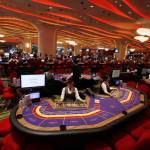Gambling both online and in real casinos has been on the rise for the last couple of years. Casinos have been seen as a tool for economic growth primarily due to greater tax revenue to state and local government and, of course, decreased unemployment from there being more local jobs.m, but its not all good all the time. Increasing need for bigger budgets and fear of loss of revenue to neighboring states, casinos have led to acceptance of online casino gambling legally. In 1978, only two states have commercial gambling; today, twenty four states have legalized it, but it is harder to keep young people away and to regulate than ever previously imagined.
What is at the core of the attraction of gambling?
There is a strong attraction to gambling for many people but this attraction manifests itself in different ways.
The allure in gambling lies in the inherent desire of human beings to take risk; placing bets with a chance you may win or risk losing your money. People go to casinos to experience the thrill and intensity of risk taking. This statement is however in contradiction to the fact that humans are wired to avoid risk.
Human beings seek to eliminate risk of every practical opportunity that presents itself. When it comes to gambling however, we accept the risk. If we were to dwell on the risk of losing money, we would not enjoy gambling as much.
Casinos on the other hand employ tactics to beat risk when it comes to meeting shareholder expectations and expected revenues. If casinos eradicate risk at every chance, why do gamblers continue to delight in risk taking?
We have to remember that risk involves chance and gambling is all about chance. When you bet, there is a chance that you will win and since gambling involves a chance of winning, we also accept the risk of losing. The chance of winning money is what gives gambling its excitement and thrill.
Many people believe that the thrill in gambling lies not with the monetary gains involved but the thrill of risk and outcome of the bet placed. Emotions are a powerful driving force in people. People who are excited by taking on big risks are attracted to gambling for the sake of it rather than the chance of winning.
Everyone needs a little excitement and gambling offers this. Hope is also an allure to gambling. Gamblers can burn through their fortunes and fortunes of the families chasing the hope of a win. This is a reason why gambling becomes addictive. Each and every wager placed represents an opportunity for a big win.
Each and every gambler plays the games according to their risk and comfort levels. Many players prefer an easy game of slot machines and others prefer a game of skill such as poker. But each of them experiences a rush at that moment that chance or luck could change their life. The rush can become contagious in a crowd of players if the stakes are high enough. In that moment where anything can happen, it becomes a moment of hope. This rush is what keeps people coming back for more.
Dr. David Forest, a professor of psychiatry at Colombia University says that gambling initiates a chemical response in the brain, a release of dopamine, that controls the brains reward and pleasure centers. He goes further to explain, using slot machines as examples, that the randomness of numbers generated by such machines cannot be comprehended by our brains properly.
People don’t know what to do with random numbers and therefore associate them to the laws of the universe which are mysterious.
Many slot players he says react to this randomness in superstitious ways for example rubbing charms over the machine or praying for luck.
From a historical perspective, it can be argued that the attraction of gambling comes from the ancient connection of being blessed. Thousands of years ago in ancient societies, shamans or seers would roll special stones, shells or animal bones for the purpose of divining the will of the gods or deities. Knowing the will of the gods was seen as a way to guarantee against risk. However as different as casino visitors are, some may consider their winnings to be a blessing from God and others feel lady luck has smiled on them.
If risk isn’t an acceptable explanation for the need to gamble, don’t worry there are more. It is the obvious: a chance to win money drives many people to want to gamble. The house always win- a popular saying when it comes to gambling and this fact makes every dice rolled, every card dealt more enticing in an anticipation of a positive win outcome. Potential money can be argued as the main attraction of gambling rather than risk because after all, it has been said that money won is twice as sweet as money earned.
The major effect of winning of gambling is the chance of a ripple effect. A person can interpret winning as a sign that his/her luck is changing. However the anticipation of a win can bring out a phenomenon known as the gamblers fallacy. This is whereby a gambler believes that each losing streak is one step closer to a win. This phenomenon holds some merit. If winning is possible in gambling, then not winning could mean a gambler is one loss away from a win. The problem with this fallacy is that a gambler may run out of money before their luck turns around. The logic behind gamblers fallacy is that the more they play, the more they need to win and the more they believe they will win if they continue playing.
Online gambling is more preferred in tgis regard due to the fact that it has no restrictions and it’s much faster paced. It allows people to play games from their comfort of their homes and phones as long as they have an internet connection and provides a quiet atmosphere as compared to casinos. Many already have apps exclusive to the resort. Both mobile phone and online gambling however is afflicted with the problem of scam, cheats, and fly by night operations. You should equip yourself with sufficient information on reputable online casinos before gambling.
Casinos spend a whole lot of money to create an enticing experience, expand into hotels, restaurants, spas and movie theaters to cater to families also. The fact that they help the economy certainly doesn’t hurt. Despite many issues arising from the casino gambling industry, it is here to stay and the only question is whether its popularity will increase in the near future or will it join with the popularity of video games that produce similar effects.







